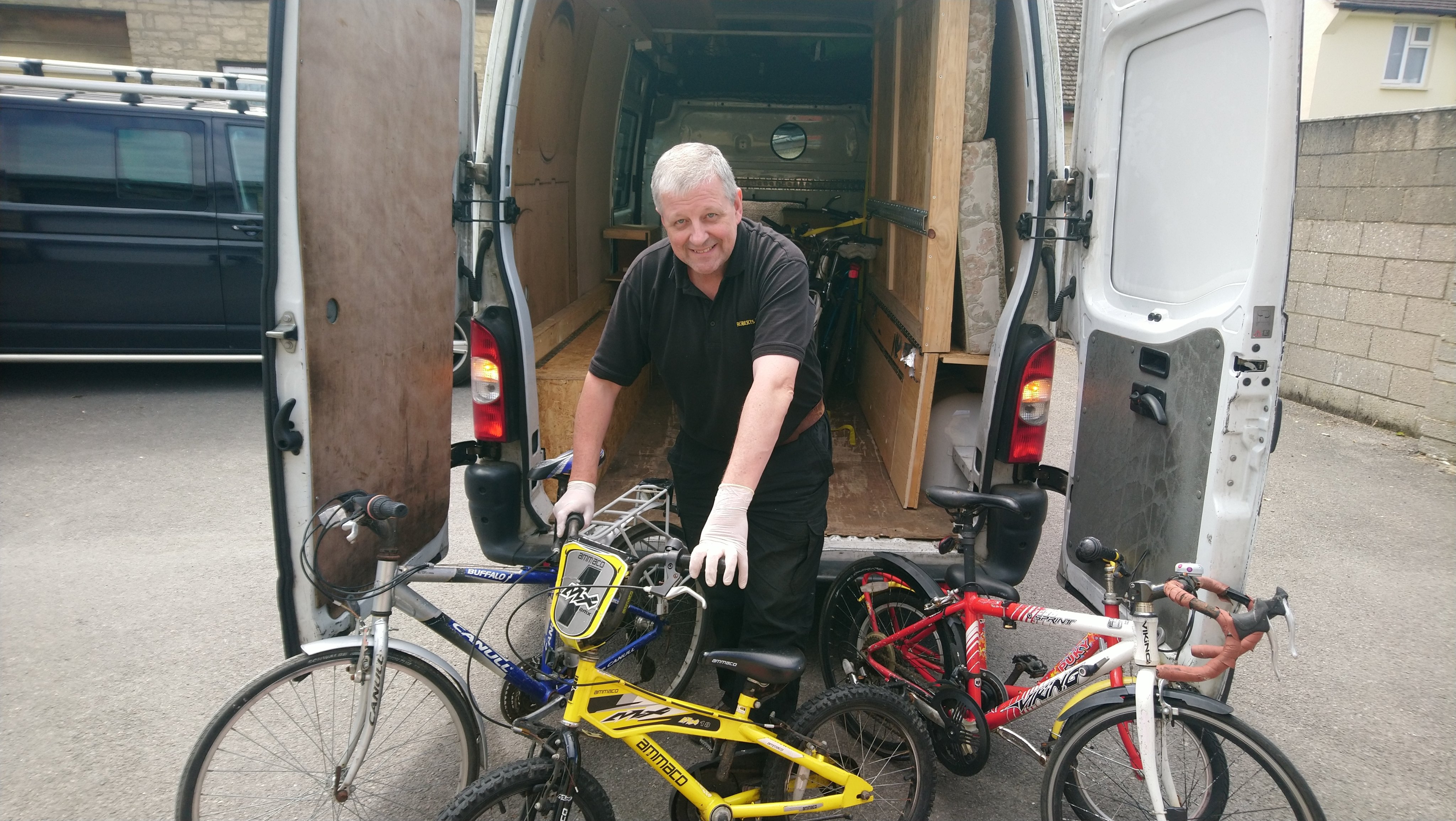Reducing inequality in Oxford: what Covid innovations can be sustained?
Posted on 13 Aug 2020 Categories: Blog, Coronavirus, Local initiatives, The place we want
by Caroline Hartnell
The last few months of lockdown have seen organisations across the country finding innovative ways to meet the challenges presented by the pandemic. As we edge back to ‘normal’, a key question is whether these innovations will be sustained or we will simply revert to the pre-lockdown status quo. Oxford provides some encouraging examples of changes that look likely to be sustained.
I last spoke with Paul Roberts, CEO of Aspire Oxford, in February. Aspire is an employment charity and social enterprise whose aim is to realise a more inclusive economy and reduce inequality in Oxford. I therefore assumed that their main focus during lockdown would have been employment related. Between March 2020 and May 2020, the number of claimants in Oxfordshire increased by 10,845 or 163 per cent. This was above the increases across England (+114 per cent) and the South East (+150 per cent).
Supporting homeless adults

In fact, says Roberts, while Aspire has maintained all of its employment support projects throughout the pandemic, initially the big focus for Aspire was supporting adults who were homeless. Oxfordshire now has over 150 people in hotels and temporary accommodation in Oxford city as part of the ‘everybody in’ campaign to ensure people rough sleeping or in communal shelters were in Covid-safe accommodation – ‘quite an amazing feat’. Aspire was one of the agencies enabling that to happen.
At this point, people are still in hotels, but what happens when they come back into commercial use? How do you sustain progress, and support people moving into long-term stable accommodation? It would be tragic to simply revert to the pre-Covid situation and put people back on the streets.
The situation is made more difficult by Oxford being such an expensive city, with such an acute lack of social and affordable housing and very little empty housing stock – even pre Covid, Oxford was a priority city for the Ministry of Housing for these reasons. Central government is committing some funds, but the options for the city council are limited.
But things are happening. Aspire has approached a landlord with a whole block of empty properties in central Oxford and offered to take on the lease for ‘meanwhile use’ to refurbish and manage the properties, making them available for people who need intensive support and help moving on to other properties. The first of these opened in early August to welcome its first residents from the hotels, and will be available for the next two and a half years.
This is not a new project –there was a housing crisis before the pandemic and the local authority had already committed to undertaking a feasibility study on shifting towards a Housing First and housing-led approach – but the pandemic has accelerated the shift. ‘Housing First’ refers to a specific model, developed in Finland and now being piloted in the UK and championed by Homeless Link. Pre Covid, Aspire had already committed itself to rolling out Housing First and housing-led projects in Oxfordshire, to help build the evidence base and demonstrate that this is the best route forwards. They are now looking to enhance this further by adopting the very successful social enterprise lettings model developed by Homes for Good in Glasgow. ‘But there is now much more interest,’ says Roberts. ‘There is a shift from Housing First and housing-led initiatives being pilots to being the norm, an accepted part of the bigger strategy to tackle homelessness.’
Aspire is also looking into introducing social enterprise letting services, approaching private landlords and managing lettings for them. The properties would be used for accommodation with low-level support. ‘Obviously this is not for every landlord,’ says Roberts. ‘We’d want rents to be genuinely affordable and that’s a cultural shift that still needs to happen.’ So far social enterprise letting services seem to have been very successful in other areas, but ‘we’re at the stage of assessing feasibility so we’re trying not to get too excited about it. There is still a massive challenge, still hundreds of people in very precarious situations.’ The suspension of evictions will be stopped at the end of August, and, along with the end of the furlough scheme in October, this could bring ‘a whole new swathe of evictions’.
Employment support
The other big focus for Aspire is employment support. The current unemployment rate is high in Oxford, especially in particularly affected sectors such as retail, hospitality and leisure. ‘We’re looking at how we can have a presence in the most affected communities and offer support to help people retrain and redeploy,’ says Roberts. ‘We are now recruiting people to be based in communities – a new step for Aspire.’ They will be working from what the city council calls locality hubs, in effect community centres.
Oxfordshire is lucky in that it had a buoyant economy before the crisis, but it’s too early to tell to what extent the most affected economic sectors will bounce back, and where new recruitment will take place. The impact of the coming exit from the EU on car manufacturing and light manufacturing in east Oxford is another unknown.
What about jobs in the green economy? ‘I’d love to see more green jobs created, under the developing #BuildBackBetter narrative, which we support,’ says Roberts, ‘but as yet there’s no sign of the central government stimulus needed to encourage recruitment to these jobs at a significant scale.’

Another thing Aspire is looking into is whether they can make use of volunteers mobilised during the pandemic. ‘During the pandemic the Oxford Hub had a fantastic Oxford Together volunteer programme responding to the health and practical support needs of the most vulnerable in the city,’ says Roberts. ‘And the legacy is a mobilised pool of people. Some will go back to work but some will still want to volunteer and will need to shift focus, responding to meeting housing and unemployment needs. We will develop and roll out a new volunteering programme on this basis.’
How has Aspire kept going financially?
Aspire has expanded its staff team to over 50 to undertake new areas of work since the pandemic. How has this been possible – so many charities and social enterprises have lost fundraising income and furloughed staff. To begin with, says Roberts, Aspire had to furlough all of its trading company staff – involved in property maintenance, grounds care, transport, etc. But it has seen a strong bounce back from May so has been bringing staff back from furlough. ‘The resumption of trade has been really helpful. Our trading areas have not been too badly affected by Covid in the medium term, and we’ve maintained our charitable programmes throughout lockdown, despite all our fundraising events being cancelled.’
So where have funds come from? Aspire had a successful emergency local fundraising appeal, Roberts explains, plus support from the National Lottery’s Communities Fund and from Crisis. So far there has been ‘not a penny of central government funding’, but local authorities can now apply for funding from the government’s new Next Steps Accommodation Programme.
Aspire is also part of #BuildBackBetter Oxfordshire, a growing coalition of organisations that want to help to realise a sustainable, inclusive economic recovery locally. A key mover here is the environmental charity Bioregional, which is championing the #BuildBackBetter narrative.

What are the limits of local action?
How much can be done locally at the Oxford/Oxfordshire level without central government support? The city council is launching its revised economic strategy for the city, says Roberts. ‘It looks exciting. It talks of a sustainable, inclusive economy, community wealth building, and adopting a triple bottom line – economic, social, environmental. But I don’t know how much it is making assumptions about central government support.’ All this was apparently ‘in the off’ before the pandemic, but it has been accelerated and heightened. ‘And the fact that the economy is on the floor presents a slim silver lining, a unique opportunity to reimagine and rebuild.’
Another element in the mix is how well community enterprises have responded to community needs in the crisis. He gives the example of Flo’s – The Place in the Park, which has kept its nursery open for key workers and its café open for food deliveries, set up a programme providing free food for people in need with other food enterprises in the area, known as the OX4 Free Food Crew, and maintained a refill shop throughout so people could get essentials. ‘This demonstrates what a community enterprise can do.’ Have they had financial difficulties in keeping going? ‘It hasn’t been plain sailing, but they’ve found innovative ways to keep trading and meet community needs.’
The county’s six social enterprise hubs, just established in February by the Oxfordshire Social Entrepreneurship Partnership (OSEP), have also been playing a key role, giving online workshops and peer-to-peer support for budding social entrepreneurs. They are part of the eScalate programme, a multiyear funded programme with the aim of supporting the development of social enterprises in Oxfordshire. This takes us back to the core vision of social enterprises as more likely to help realise an inclusive economy and reduce inequality. They are more likely to pay a living wage, and to procure goods and services from each other. ‘Large anchor organisations need more choice of social enterprises if they want to procure locally,’ says Roberts.
These anchor organisations also need to go on their own ‘social procurement’ journey, he admits, for example breaking up big contracts to make them accessible to social enterprises, and developing new relationships with social enterprises in their local area. Unfortunately, says Roberts, there is nothing at the moment to suggest a central government shift away from its ‘redundant, ineffective outsourcing model’. The probation service, an ‘utter privatisation disaster’, is being brought under the wing of a national probation service from next summer, but certain elements will still be outsourced – eg housing support. Here the new contract area will be the whole of south central area, ie the whole of Thames Valley, Hampshire and the Isle of Wight combined – an area far too large for any social enterprise to bid for.
‘It’s encouraging that you can make real change at local level, and there is an increasing appetite for collaboration on this, but you always come up against the wall that local government has much reduced funding power, and central government’s ambition and mindset is not to make available the funds and opportunities needed.’
Want to keep up-to-date with our coronavirus coverage? Sign up to our newsletter.
Posted on 13 Aug 2020 Categories: Blog, Coronavirus, Local initiatives, The place we want
